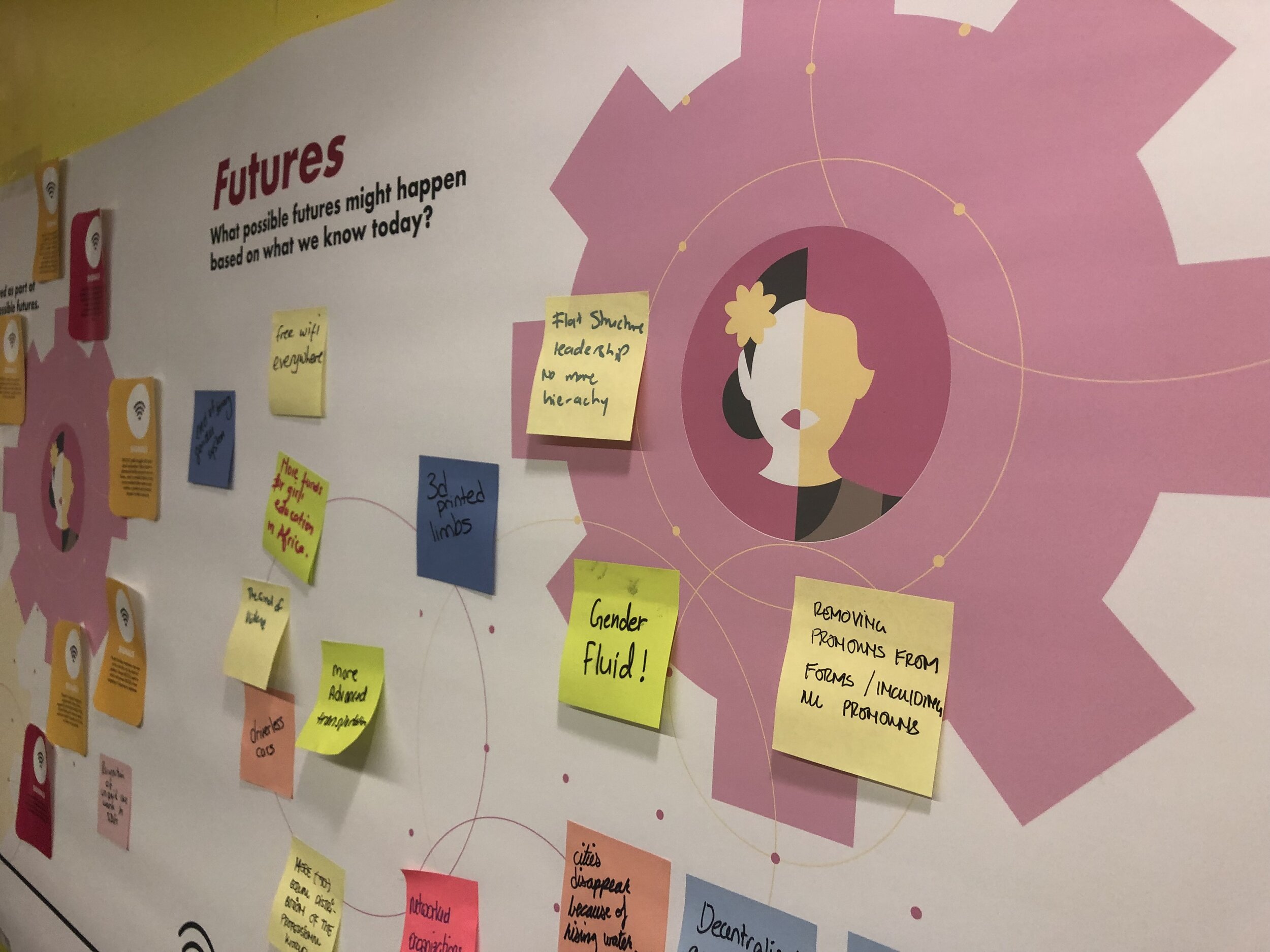Design
makes
futures
Imagining futures is enormously powerful as it allows people to better understand the role that possible futures might play in what they see and do. Design as a discipline not only helps people imagine potential futures but provides a roadmap for creating future realities. Drawing from speculative design, systems thinking and strategic foresight, I create frameworks to guide critical future thinking, to ignite the ideation process and help bring to life complex concepts.
Case Study: Exploring futures with women’s civil society organizations
In the light of a shrinking space for civil society and an increased competition for limited funding, civil society organizations (CSOs) are also confronted with rapidly changing environments with new and interconnected challenges, players and power dynamics impacting their work. These challenges include issues such as climate change, rapid urbanization, irregular migration, humanitarian crises, the digital revolution, and changes in the role of businesses amongst others. CSOs wanting to operate in this context and continue to provide social value to their societies require a profound shift in their mindset and capabilities to adapt, to innovate and to transform the way they operate – from rethinking their programming to their management style, their funding models or their mobilization and partnership models.
01.
Challenge
Recognizing the vast expertise that already exists on organizational and funding models in the third sector, but also from social enterprises and the private sector, with this project we aimed to build on existing knowledge and collective, hard-won wisdom to identify and test potential support modalities contextually-designed to the needs of the civil society sector that will enable women’s organizations to become more impactful, sustainable and resilient in an ever-evolving world with increasingly complex challenges.
Specifically, we aim to address the following question: How might we better support women’s organizations to stay relevant and agile, resilient and sustainable agents of change in ever-changing, complex contexts?
To that end, jointly with the Fund for Gender Equality (FGE), we launched a research-action initiative to identify and test potential support modalities contextually-designed to the needs of the civil society sector.
02.
Process
Applying a design process, we began with an initial hypothesis and set of questions exploring civil society perspectives - with a particular focus on women’s rights organizations - about:
alternative funding and partnerships models
alternative organizational culture, values, and operations
alternative programmatic approaches
which provided the framework for our research plan. To the end of identifying areas of opportunity, and evaluate further opportunities for the FGE to support women’s civil society we synthesized our initial findings shaping our first co-creative session.



03.
Exploring potential futures
Conceived as a co-creative workshop, this session provided four key insights from the research phase - i.e. regarding the need for networks and partnerships; the issues around donor-driven agendas; the needs and priorities of WCOs; and challenges with self-care - and asked for participants’ views in a ‘World Café’-style activity.
Following this initial activity, a futuring session took the participants to explore fictitious future scenarios to explore new ideas for WCSOs’ resilience and sustainability. This challenged the participants to think outside of the box and then apply new “realities” in these fictitious future scenarios. Findings of this session were again synthesized leading to opportunity areas which formed the starting point of our two-day prototyping workshop in April 2019.
04.
Prototyping
Building on the outcomes of the futuring session, we continued our process with a two-day workshop that was organized on 15th and 16th April 2019 at UN Women Headquarters.
In preparation for the workshop, participants were asked to complete an impact diary encouraging reflection on our three main areas of inquiry on alternative funding and partnerships models; alternative organizational culture, values, and operations and alternative programmatic approaches. Participants were asked to share their reflections and findings over the course of the first morning of the workshop before moving into ideation in the afternoon.
Split up in smaller groups around different areas of opportunity, facilitators led participants through a series of ideation methods resulting in a great number of ideas around four opportunity areas. Following a voting process, the four most promising ideas were chosen, further refined and broken down in small facilitated groups. Prototypes were developed and build given initial concepts shape and form. Following several rounds of iteration, share-backs, and presentations four final ideas emerged which teams presented to senior management concluding the workshop.
The implementation of prototypes in currently still underway - for further information on this project please contact me via email.


